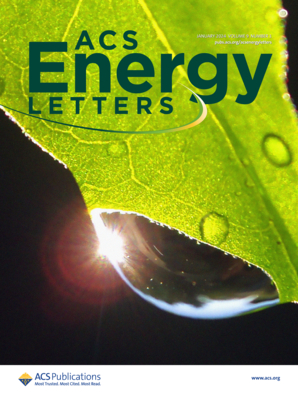Steric Hindrance Manipulation in Polymer Electrolytes toward Wide-Temperature Solid-State Lithium Metal Batteries
IF 19.3
1区 材料科学
Q1 CHEMISTRY, PHYSICAL
引用次数: 0
Abstract
Solid-state lithium metal batteries (LMBs) based on polymer electrolytes have become a hot topic for next-generation energy storage owing to their high specific energy, flexibility, and simple preparation process. However, poor electrolyte–electrode interface reactions and intrinsically slow Li+ transfer kinetics limit the development of solid-state LMBs. Here, a tris(4-fluorophenyl)phosphine (T4FPP) additive with strong steric hindrance and weak coordination is introduced to remodel the Li+ coordination environment to facilitate electrolyte bulk and interface charge transfer. Furthermore, theoretical analysis combined with in situ/ex situ characterizations demonstrate that the addition of T4FPP helps to construct an anion-dominated solvation structure through molecular crowding and form a LiF/Li2O-rich SEI layer. Ultimately, the LFP|Li full cell based on the T4FPP modified electrolyte works normally even at 10 C with a reversible specific capacity of 88.9 mAh g–1. Simultaneously, the electrochemical performance at 0–60 °C further verified the wide temperature range adaptability of the electrolyte.

宽温固态锂金属电池中聚合物电解质的位阻操纵
基于聚合物电解质的固态锂金属电池(lmb)以其高比能、柔韧性和制备工艺简单等优点成为下一代储能领域的研究热点。然而,较差的电解质-电极界面反应和本身较慢的Li+转移动力学限制了固态lmb的发展。本文引入强位阻弱配位的三(4-氟苯基)膦(T4FPP)添加剂,改造Li+配位环境,促进电解质体积和界面电荷转移。此外,理论分析结合原位/非原位表征表明,T4FPP的加入有助于通过分子拥挤构建阴离子为主的溶剂化结构,形成富LiF/ li2o的SEI层。最终,基于T4FPP改性电解质的LFP|Li全电池即使在10℃下也能正常工作,可逆比容量为88.9 mAh g-1。同时,在0-60℃的电化学性能进一步验证了电解质的宽温度范围适应性。
本文章由计算机程序翻译,如有差异,请以英文原文为准。
求助全文
约1分钟内获得全文
求助全文
来源期刊

ACS Energy Letters
Energy-Renewable Energy, Sustainability and the Environment
CiteScore
31.20
自引率
5.00%
发文量
469
审稿时长
1 months
期刊介绍:
ACS Energy Letters is a monthly journal that publishes papers reporting new scientific advances in energy research. The journal focuses on topics that are of interest to scientists working in the fundamental and applied sciences. Rapid publication is a central criterion for acceptance, and the journal is known for its quick publication times, with an average of 4-6 weeks from submission to web publication in As Soon As Publishable format.
ACS Energy Letters is ranked as the number one journal in the Web of Science Electrochemistry category. It also ranks within the top 10 journals for Physical Chemistry, Energy & Fuels, and Nanoscience & Nanotechnology.
The journal offers several types of articles, including Letters, Energy Express, Perspectives, Reviews, Editorials, Viewpoints and Energy Focus. Additionally, authors have the option to submit videos that summarize or support the information presented in a Perspective or Review article, which can be highlighted on the journal's website. ACS Energy Letters is abstracted and indexed in Chemical Abstracts Service/SciFinder, EBSCO-summon, PubMed, Web of Science, Scopus and Portico.
 求助内容:
求助内容: 应助结果提醒方式:
应助结果提醒方式:


